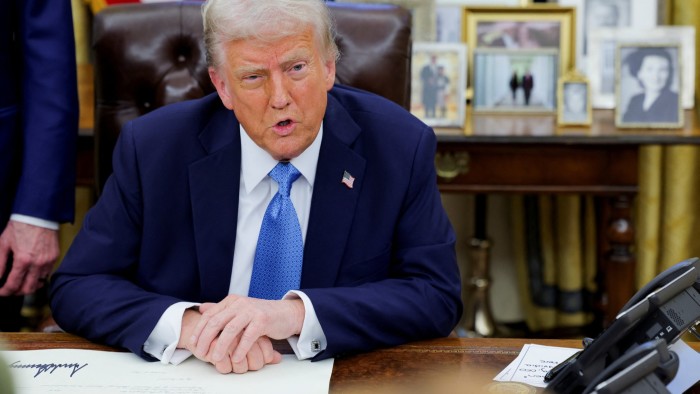Donald Trump has said he will hit the EU with tariffs, adding the bloc to a list of targets including Canada and Mexico and bringing the US to the brink of new trade wars with its biggest trading partners.
The US president acknowledged that the new tariffs could cause some market “disruption”, but claimed they would help the country close its trade deficits.
“The tariffs are going to make us very rich, and very strong,” Trump told reporters in the Oval Office.
Hours before his plan for tariffs of 25 per cent on Canada and Mexico was due to take effect on February 1, Trump also widened his threat to include the EU, which he said had treated the US “very badly”.
“Am I going to impose tariffs on the European Union? . . . Absolutely,” Trump said. “They don’t take our cars, they don’t take our farm products, essentially, they don’t take almost anything,” he said. “And we have a tremendous deficit with the European Union. So we’ll be doing something very substantial with the European Union.”
The president’s comments, coming less than two weeks after his return to the White House, marked a sharp escalation in his rhetoric on trade and mean the world’s biggest economy is on the verge of imposing tariffs on its most significant trading partners.
US goods imports from the EU, Canada, Mexico and China were $1.9tn in 2023, about 60 per cent of the total, according to customs database Trade Data Monitor.
Trump said he also “eventually” put tariffs on chips and “things associated with chips”, and would apply tariffs to oil, gas, steel, copper, aluminium and pharmaceuticals.
Tariffs on steel and aluminium could come as soon as “this month, next month”, he said, while oil and gas tariffs would happen around February 18.
The US dollar strengthened on Trump’s comments, leaving an index of the currency against six peers up about 0.6 per cent. West Texas Intermediate, the US oil benchmark, rose more than 1 per cent to $73.81 a barrel.
Trump said he would “probably” reduce the tariffs on Canadian oil to 10 per cent, although other imports from the country would be taxed at 25 per cent. Canada is by far the US’s biggest foreign oil supplier, accounting for about 60 per cent of its crude imports.
The president said there was “nothing” Canada and Mexico could do overnight to prevent him from applying tariffs against their imports.
“It’s not a negotiating tool,” Trump said. “It’s pure economic. We have big deficits with, as you know, with all three of them.”
Economists say sweeping tariffs would be inflationary and could prevent the Federal Reserve from reducing borrowing costs as much as anticipated this year. Some central bank officials had already started including Trump’s policies in their forecasts in December, before he took office.
Hitting the US’s biggest trading partners with steep tariffs sharply raises the risks of igniting full-blown trade wars just days into Trump’s second term as president.
Both Canada and Mexico have prepared packages of retaliatory tariffs and are ready to implement them. The EU has also said it would defend itself with retaliatory tariffs, as it did in Trump’s first term.
“We’re ready with a response — a purposeful, forceful but reasonable, immediate response,” Canadian Prime Minister Justin Trudeau said on Friday. The Liberal premier warned Canadians that the nation “could be facing difficult times in the coming days and weeks”.
Canada’s former finance minister Chrystia Freeland, who is running to replace Trudeau, on Friday urged Ottawa to retaliate against any US tariffs by adding huge levies on Tesla vehicles to punish Elon Musk, one of Trump’s top allies.
Trump indicated he was unmoved by economists’ warnings that new tariffs would hurt the US economy or risk a leap in inflation as importers passed on the increased cost of their goods to consumers.
“Tariffs don’t cause inflation, they cause success,” he said.
But Democrats warned much of the burden would be passed on to American consumers. “Donald Trump is aiming his new tariffs at Mexico, Canada, and China but they will likely hit Americans in their wallets,” said Chuck Schumer, the Senate minority leader.
“If these tariffs go into full effect, they will raise prices for everything from groceries, to cars, to gas, making it even harder for middle-class families to just get by.”
Trump first threatened to hit Canada, Mexico and China with steep tariffs in November, accusing them of allowing illegal migration and not doing enough to halt trade in fentanyl, an illegal and deadly opioid.
Business lobbyists in Washington, worried about the effects on US supply chains and the costs of goods, had hoped that the president would take a more moderate approach and not immediately apply a 25 per cent levy.
Other options included delaying the tariffs to allow the Canadian and Mexican governments more time to negotiate with the Trump team over border security, or introducing the tariffs gradually and increasing them over time.
Additional reporting by Harriet Clarfelt







